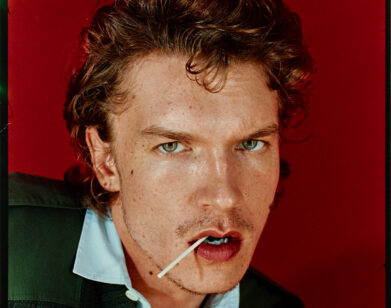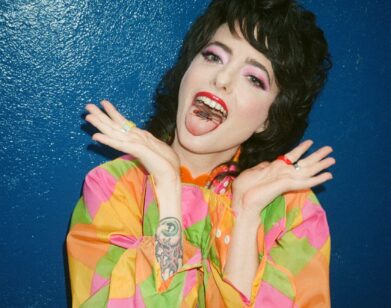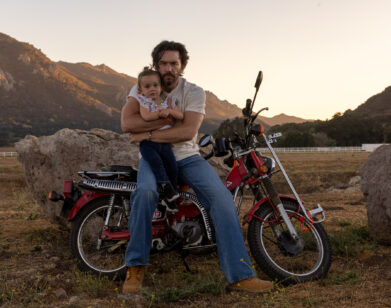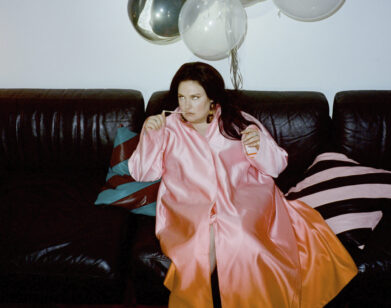in conversation
“I Was Kidnapped”: Edgar Ramírez Tells Nicole Kidman About His Life Less Ordinary
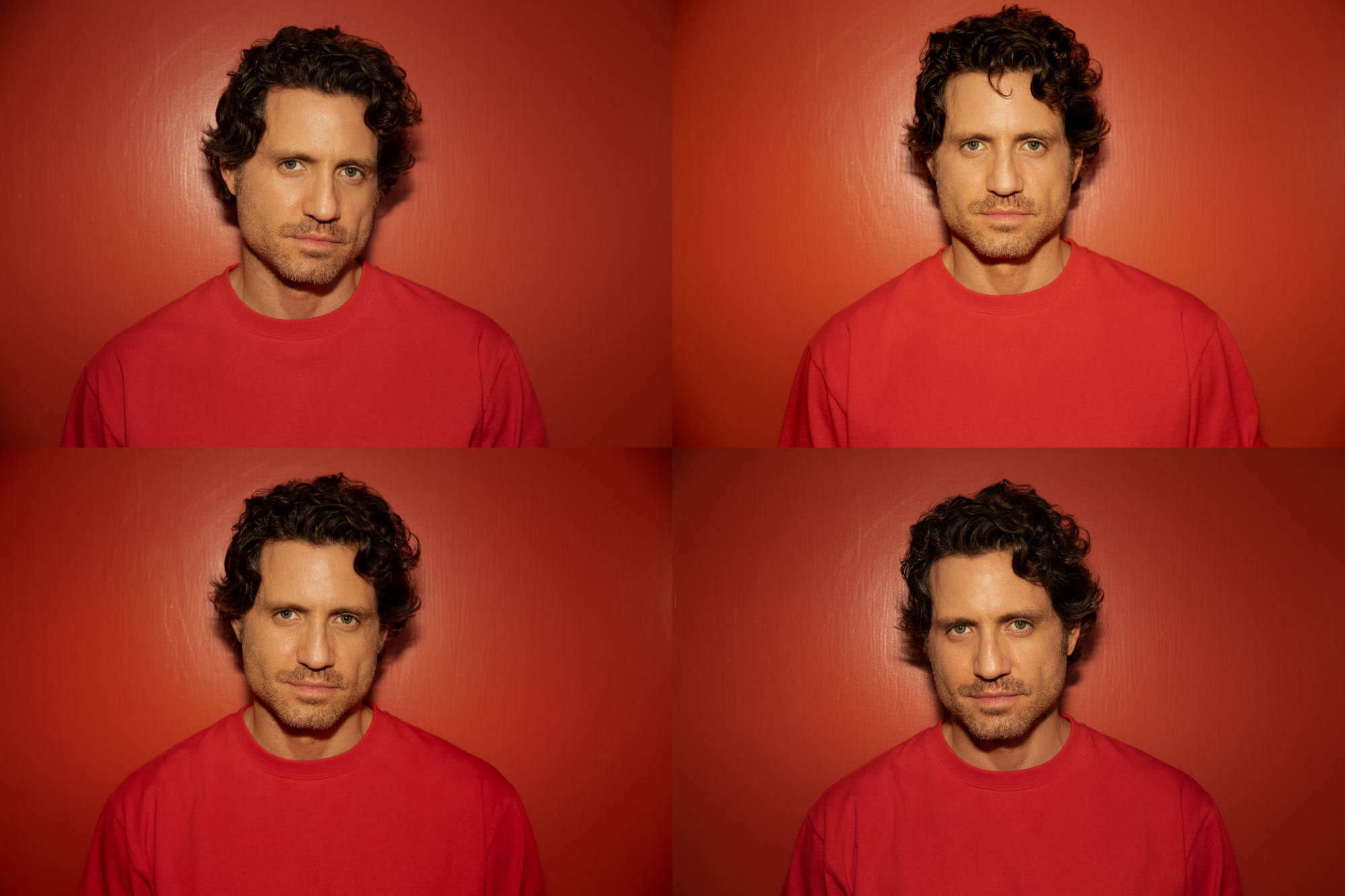 Fresh out of college and armed with a degree in communications, Edgar Ramírez was preparing for a career in journalism. The Venezuelan-born actor moved around a lot as a child, and was determined to live a worldly life telling stories about extraordinary people. In a twist of fate, he has managed to do just that, only from the inside looking out. Since launching his career on the telenovela Cosita Rica, Ramírez has embodied some of history’s most complicated and compelling figures. There was his star turn as the terrorist Carlos the Jackal in Oliver Assayas’s Carlos, his fiery portrayal of the legendary boxer Roberto Duran in Hands of Stone, and, most recently, his uncanny rendering of the late designer Gianni Versace in The Assassination of Gianni Versace: American Crime Story. He has played CIA operatives, Cuban revolutionaries, and an elf. This past summer, the prolific actor starred as a bank robber pulling off one final heist (is there any other kind?) in the dystopian action movie The Last Days of American Crime, and reteamed with Assayas for the Cuban-spy thriller Wasp Network, both of which are streaming on Netflix. This month, he’ll appear as a detective in the HBO miniseries The Undoing, about a therapist whose life comes apart after her husband disappears. But, as he tells his Undoing costar Nicole Kidman, the most extraordinary life he’s lived has been his own. —BEN BARNA
Fresh out of college and armed with a degree in communications, Edgar Ramírez was preparing for a career in journalism. The Venezuelan-born actor moved around a lot as a child, and was determined to live a worldly life telling stories about extraordinary people. In a twist of fate, he has managed to do just that, only from the inside looking out. Since launching his career on the telenovela Cosita Rica, Ramírez has embodied some of history’s most complicated and compelling figures. There was his star turn as the terrorist Carlos the Jackal in Oliver Assayas’s Carlos, his fiery portrayal of the legendary boxer Roberto Duran in Hands of Stone, and, most recently, his uncanny rendering of the late designer Gianni Versace in The Assassination of Gianni Versace: American Crime Story. He has played CIA operatives, Cuban revolutionaries, and an elf. This past summer, the prolific actor starred as a bank robber pulling off one final heist (is there any other kind?) in the dystopian action movie The Last Days of American Crime, and reteamed with Assayas for the Cuban-spy thriller Wasp Network, both of which are streaming on Netflix. This month, he’ll appear as a detective in the HBO miniseries The Undoing, about a therapist whose life comes apart after her husband disappears. But, as he tells his Undoing costar Nicole Kidman, the most extraordinary life he’s lived has been his own. —BEN BARNA
———
NICOLE KIDMAN: Darling, Edgar, how are you?
EDGAR RAMÍREZ: Nicole, it’s so good to hear you. You’re good? Your family is good?
KIDMAN: Yes, we’ve all stayed healthy. I broke my ankle, but it’s healed now. You and your family are good?
RAMÍREZ: Yeah, thank god. A big chunk of my family is still in Venezuela, and things are very tough there as well. But I can’t complain. I’m very lucky to be able to navigate this time in a lighter, more comfortable manner, in comparison to the people who are struggling so much.
KIDMAN: I know. Let’s talk about you and your work. Your wondrous work. The miracle of Edgar. You have two films coming out. One of them, you were doing literally two days before you arrived to work with me on The Undoing, and you had to shift from that into what you had to do with me. How did you do that?
RAMÍREZ: Do you remember when we shot together for the first time at the beach house?
KIDMAN: Yes.
RAMÍREZ: That was the first scene I shot, and I think we’d had a brief talk beforehand, but I was so nervous because I had literally arrived the day before from Spain. I got off the plane, got into a car, and then got to the little town where we shot. The next day, I was shooting. It was like, “Edgar, come here. This is Nicole. You stand here, you stand there. Let’s go.” And I had two choices. Either I could take all that energy, all that nervousness, and all that sense of awkwardness and inadequacy and just pour it into the character in the scene, or I could freeze.
KIDMAN: I loved how immediate you were in the scene, how fluid. We went straight in. The great thing is that our characters were not meant to know each other. You were meant to be interrogating me. So all the things that you brought to that because of the sensations you were carrying, you just used it. And before you know it, within three hours, I felt like I’d been shooting with you for three months.
RAMÍREZ: Great stories and great projects are like wine. It’s a harvest, and you just have to take a deep breath and go for it. I finished Jungle Cruise, then went to South Africa to shoot The Last Days of American Crime. And then from there, straight into Wasp Network in Cuba. I had to spend almost three months in Cuba, which is like being nine months anywhere else, because the time perception is completely different. There’s no internet. It’s like being back in the ’80s or ’90s. When I got back to New York, I felt like a complete alien. It felt like a new world.
KIDMAN: They sent me the link to Wasp Network, and it’s so good. I love Olivier [Assayas, the film’s director]. Obviously, you do, too, because you’ve worked with him twice. You guys create magic together.
RAMÍREZ: It’s very easy with him. He creates this atmosphere and lets the actors play. He really trusts his cast. He says that once you cast an actor, 50 percent of the character is already there, and the rest is just atmospherics. Even when you read his scripts, there’s no description, no internal dialogue. There’s no introspection, which is also something I love about his cinema. There’s no moment where the hero or the heroine sits down and says, “I did this because in the past, this happened to me.” It’s for you to fill in that information. You do the research. For example, he doesn’t rehearse.
KIDMAN: I didn’t know that.
RAMÍREZ: We didn’t rehearse with this film, and we did not rehearse on Carlos ten years ago. He’s there for you if you need him, and he’s able to answer questions, but he invites you to just go and play. The worst that can happen is that you do it again, but he will never tell you, “That was wrong.” For him, everything is right.
KIDMAN: I would love that.
RAMÍREZ: That’s how we shot The Wasp Network. You know the scene where Penélope [Cruz] and I meet for the first time at the airport? That was two takes.
KIDMAN: How many times have you and Penélope worked together? Is it three times?
RAMÍREZ: And we’re planning on the fourth, especially after the wake-up call that this pandemic has been to all of us. Life’s too short. When it works, it works. And I would love to work with you again, Nicole.
KIDMAN: I feel so safe with you. I just love being in a scene and free-falling with you—that’s what I call it. Remember that day when [the director] Susanne Bier was shooting, and we were in the apartment? It was almost like a dream, and I was having, like, a psychotic meltdown in my head. And I would look over at you, but as my character, and you were so safe. You were like this rock of understanding and care, which is a wonderful thing to have in a scene together.
RAMÍREZ: That’s why I love acting. It will never be anything but an emotional experience, because I’m not a trained actor. I never went to a performing arts school. I’m a journalist. That’s what I did before I became an actor.
KIDMAN: I didn’t know that.
RAMÍREZ: I was thrown in it by life, in a way. I was always attracted to the world of performing arts, but I’d be lying if I said I was the kid who grew up dreaming of being an actor. I wanted to travel, have great conversations, and meet people. I wanted to interview the most incredible people. In a way, my career has given me the opportunity to become some of the subjects that I would have loved to interview
KIDMAN: I’m glad you moved from journalism into acting, because we moved everything to get you into The Undoing. We have the same agent and he was like, “Oh, no. Edgar’s busy shooting.” And I was like, “Chris, you have to make this work. I don’t care what we do. Edgar and I have to do this together.” And we moved mountains. That’s the gift when you’re a producer. As an actor, you say, “I’m going to talk to the producer.” But now I am the producer. So I was like, “We’re going to move everything. We’ll be down to the wire, but he is meant for this.”
RAMÍREZ: I appreciate it.
KIDMAN: If you’d gotten sick or something, the whole production would have shut down. And you delivered so much more than we expected. Another person we share is Ryan Murphy, another great director. You did exquisite work with him [in The Assassination of Gianni Versace: American Crime Story]. He’s very different, say, to Susanne. Right?
RAMÍREZ: They’re very different, but what unifies great directors is that they know exactly what they want. When actors are in the bonfire of creativity, we want all the freedom, but at the same time, because we’re in such a vulnerable place, we also need guidance.
KIDMAN: Both Susanne and Ryan are leaders. You step onto their set, and you go, “Okay, this is going to work.” Because there’s such a strength. Ryan has a very quiet strength, and Susanne is a powerful woman. I would look over at Ryan—I suppose I’m talking about him so much because I just finished shooting with him—and be like, “Was that any good?” And he’d just look at me and nod. I know I may be doing something really bold and out there, but I also know that he believes in me, and that’s such a good feeling.
RAMÍREZ: I love the sense of teamwork. I think that’s the beauty of moviemaking. That’s why it’s so beautiful—and so violent. When it’s done, suddenly these people that you have such a strong connection with all go away. Versace was such an intense experience because we all became very close friends.
KIDMAN: I love Ryan for that. He brings people together that are meant to be together.
RAMÍREZ: He reminds me in many ways of Pedro Almodóvar. That sense of collecting talent and creative partners that they keep going back to, placing them in different situations and in different times and characters. It’s like the circus. It’s the theater group, going from town to town and playing different characters. It’s a beautiful tradition.
KIDMAN: How did you become so elegant? Because you’re very elegant, Edgar. Where does it come from?
RAMÍREZ: I should be asking you that. I don’t come from a rich family, but I come from a family that achieved many things throughout their lives and tried to provide the best opportunities, especially education, for my sister and I. My father was in the military, and we traveled a lot. That was defining for me. I lived in many different countries as I was growing up, which also gave me the opportunity to learn different languages. I basically spent my childhood in Latin America, and my teenage years in Europe, and then my early 20s working as a journalist and traveling. In my late-20s I became an actor, and then my career gave me the opportunity to get in touch with the world that I’ve always dreamed of. It’s not necessarily the world of glamor. I do enjoy beauty and glamor, and I don’t take it for granted. I don’t find it frivolous. It’s something that you have without ever sacrificing the commitment that you give to your characters. You have the sexual, animalistic quality that makes people want to watch you and to see you.
KIDMAN: We’re talking about you! Don’t talk about me! That’s what I mean by your elegance, you see?
RAMÍREZ: I don’t know if it’s elegance.
KIDMAN: It’s your heart. You have a very generous heart. We share an agent who’s also our friend, and his mother recently passed away. And he said that you wrote him the most beautiful letter and sent him flowers when she passed. He didn’t tell me what was in the letter, but he said, “Edgar just appeared out of nowhere and wrote this, and sent these flowers.” And I just went, “Yeah, that’s Edgar.” That needs to be said, because so many people don’t show up for other people, but you do.
RAMÍREZ: What else are we here for but to connect?
KIDMAN: A lot of people don’t end up on that path.
RAMÍREZ: I came of age in the ’90s, and I remember when suddenly it became fashionable to be cynical and ironic all the time. And that’s what allows you to be insensitive to certain things, because you’re creating a distance, like things don’t affect you. It requires a lot of talent and compassion to use irony in a way that is both sharp and at the same time has the ability to make you reflect about things that you normally wouldn’t. I don’t know if I’m rambling.
KIDMAN: You’re not rambling. You’re wonderful to listen to.
RAMÍREZ: And that’s why I do what I do. I want to get closer. I want to understand our nature as human beings, with all the contradictions, with all the light and all the darkness, and try to find answers, because life is tough for everyone. Life is complex for everyone. We all have our things to understand and to resolve. The same reason I wanted to be a journalist is the same reason why I’m an actor. I just want to get close. And then, of course, when someone suffers, the shock of death, it’s hard to deal with that. I don’t deal very well with the concept of death. I haven’t come to terms with it. I’m really afraid of death.
KIDMAN: You personally, or the people around you dying? My own death is probably less frightening to me than the death of people around me. I can’t bear the idea of that. I’ve had people taken very suddenly in my life, and that’s created an instability in the way I view the world, where it’s all beyond our control. The idea of when someone’s there, and then 20 minutes later, they’re gone so suddenly—I’ve had that happen about four times now in my life, with people that I’ve loved so much, and it’s just devastating to me. I have that fear of that 3 a.m phone call.
RAMÍREZ: I remember when I was a kid, and I was living in Bogotá, during the narco-terrorism of Pablo Escobar. That’s the reason why I haven’t been able to play a drug lord regardless of the countless offers that I’ve had. It’s not a political reason. Of course, there’s something artistic to be discovered in characters like that, and I have friends who’ve played them beautifully. But for me, it’s very personal. My father’s best friend was killed by Pablo Escobar.
KIDMAN: Wow. Edgar.
RAMÍREZ: I remember being 5 years old and getting on the school bus with my sister—we went to this school that was on the other side of the city, a nice school, because the children of diplomats and politicians attended that school. My sister and I attended it because my father was in a diplomatic post in Bogotá, and we had bomb threats every month.
KIDMAN: Good lord.
RAMÍREZ: As a 5 year old, you don’t understand the gravity of the issue. But what I do remember is that every time I said goodbye to my mom, and I thought about the possibility of a bomb going off there in the bus, or that school, my thought was not about me dying, it was about not seeing my mom again: “If I die today, I won’t be able to come back in the afternoon and have lunch with her.” That was my fear.
KIDMAN: Which is about connection, and the ability to have them.
RAMÍREZ: Yeah, and also to be grateful. I mean, friends of mine have been killed, and I was kidnapped myself once, and the thought I had was, “I won’t be able to see the people I love if I don’t survive this.”
KIDMAN: Oh, Edgar…
RAMÍREZ: It’s the first time that I’ve shared this.
KIDMAN: You were kidnapped?
RAMÍREZ: I was kidnapped, like in a movie. With submachine guns.
KIDMAN: For how long?
RAMÍREZ: It was for about three hours. But then they let me go. At the time, though, when they found out that it was me, that I was an actor—well, it was a flipped coin. Thankfully what happened, was they said, “No, this guy’s too big for us to hide him, so let’s just let him go.”
KIDMAN: Oh my lord!
RAMÍREZ: The worst thing about being kidnapped is not the violence or the fear of getting killed, it’s the arrogance. The assumption that your life belongs to them, that from that moment on, you’re not in charge of your own decisions. That your life does not belong to you. That’s why I don’t take anything for granted. Being an actor, we live a lot of life. We’re collecting a lot of experiences in the shortest amount of time. Acting has been an amazing way to try to get ahead of biology, in terms of collecting experiences. When I was in South Africa, it was the closest thing to the atmosphere that I felt from Venezuela. The beauty of the people and the openness and warmth, but at the same time there is tension in the air. I had to have bodyguards when we were shooting The Last Days of American Crime.
KIDMAN: Right.
RAMÍREZ: It’s so weird, because the mood of the movie taps into the stuff that we’re reading about, this conflation of chaos and desperation, with the deployment of incredibly intrusive technologies, and with death and hunger in a high-tech world of powerful superstates. That has been the theme in science fiction and graphic novels for decades. But now, you turn on your television, and it’s real.
KIDMAN: Geez.
RAMÍREZ: I come from a country that is a superstate. Venezuela is a full-on dictatorship, where they use anything to tighten the grip on society.
KIDMAN: Hearing about your past and your history and what you’ve been through, obviously that so permeates your work. But it also makes me so excited about your future, and I so want to be a part of it.
RAMÍREZ: Thank you. Me too, Nicole.
KIDMAN: We’re lucky to have you in the world. So may our paths cross again.
RAMÍREZ: We’ll hug each other soon, alright?

